hockey column

3/29/2024 – Michigan 4, North Dakota 3 – 22-14-3
3/31/2024 – Michigan 5, Michigan State 2 – 23-14-3, Frozen Four
Twice this Easter weekend Michigan Hockey plodded onto the ice, through the tunnel that led from the shanty locker rooms to the playing surface inside this bizarrely small NHL practice facility in suburban St. Louis, facing the biggest twenty minutes of their season. Make it or break it to continue playing hockey with this same group of 26 men. On Friday night, Michigan was down 2-1 entering the third period against a team that was 20-0-0 this season when leading after two. On Sunday night, Michigan was tied 1-1 against a team that had, consistently in the season series, closed games better than they had.
In both cases, Michigan authored a final period for the ages. Friday night's dramatic eruption, three unanswered goals (two in the first three minutes) against North Dakota to wrestle control of the contest, seemed like it was going to be the third period of the season. The one we look back on years in the future and think, "that third period was the best they played all season". But then Sunday's may have been better. Save for a two minute stretch that saw Michigan commit a stupid penalty and then give up a tying goal on an even stupider penalty kill coverage breakdown, Michigan threw haymaker after haymaker and asserted themselves as the better team on that day. They scored four times on Michigan State's vaunted goalie, and all of them were tremendous high skill plays that left the goalie little chance.
On both nights, Michigan seemed to find a fire. They flipped a seeming switch and after two even periods decided "no, we're the better team in this game". The manner in which the Wolverines throttled North Dakota was astonishing, especially after two iffy periods preceding it. They outshot the Fighting Hawks 14-1 at one point in the third period and put the three goals in the net to flip the score from 2-1 to 4-2. There were a few wobbly moments in the 6v5 play, but that dominance was enough to get it done. At 5v5, Michigan was head and shoulders better than NoDak on that night, after they hadn't been at all over the prior 40 minutes. It left a Dakota team, which was so accustomed to comfortably slamming the door on games they were leading, stunned over what had happened to them.

[UMich Athletics]
In the Sunday game, the true "flip the switch" moment came after the Spartans tied it at 2. Michigan had been the better team in the first half of the third period, but it was only by a nose and I don't think it was too out of whack from the first 40 minutes. The opening two periods were pretty even, each team getting some looks, scoring a goal and having their goalies look sharp to keep the score deadlocked. Michigan began to inch ahead in the third and went up 2-1, but gave it back on the penalty and subsequent PK blunder. The score was tied 2-2 with time perilously slipping away, anyone's guess on what was going to happen next.
If you were a Michigan partisan, you may have had that sinking feeling based on how previous meetings this season between Michigan-MSU went. MSU, generally, had closed out games better. They also had, generally, gotten the bounces. No better example of this than the game last weekend. It felt in that moment that perhaps Michigan had blown their chance to put the game away with the power play goal they'd ceded. But then came the flip the switch moment, when Michigan's highest skilled players decided "enough with this nonsense, we're winning this game". Dylan Duke, known primarily for greasy goals and who fell in the NHL Draft three years ago due to his subpar skating, decided to look like Connor McDavid with a rush down the wing, toasting the defensemen, deking Trey Augustine, and slipping the puck by him far side.
And then, before you could pick your jaw up off the floor, Michigan took advantage of a scattered Spartan neutral zone right off the ensuing center ice face off to spring Frank Nazar III with a rush down the wing. Nazar pulled off the Deke/Pass of the Century going between the legs and then snapping a pass across to Gavin Brindley, past the MSU defender, and right in Brindley's wheelhouse. Brindley made no mistake and rifled the puck by the sliding Augustine, who had very little chance to come up with this one. Two goals in 12 seconds, 2-2 to 4-2 just like that. A 50-50 game to a 90-10 win probability game in the blink of an eye. Michigan's punishing 5v5 defensive structure salted the game away, MSU took a late penalty that Michigan scored on, and that was that.
[AFTER THE JUMP: Michigan's 2024 turnaround]
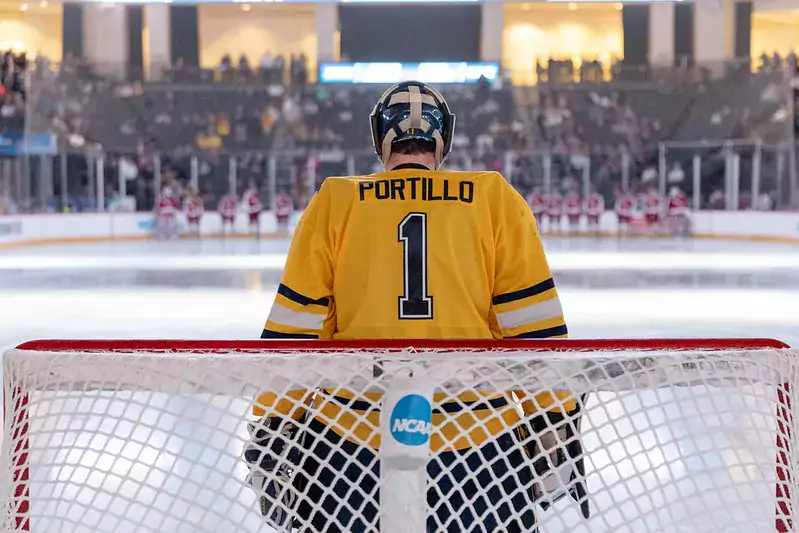
4/6/2023 – Quinnipiac 5, Michigan 2 – 26-12-3, Season Over
Goaltending has a strange place in the sport of hockey. It's common jargon among hockey analysts to say that a given team was "the better team" in a given game, if the balance of chances and territorial map of play favors that team. What that phrase ignores is the goaltending component... we say that a team was "the better team" as if the goalie is not part of the team, when in fact goaltenders are the most important part of the team.
When I analyze hockey, I view goaltending as this final adjustment of sorts. I sit down and look at the two teams' roster of skaters and how they match up to get a sense of the balance of chances, take a peek at the names to get a feel for the caliber of shooters, and then figure out which team is "better". After that, I examine goaltending and adjust my feeling accordingly. In some cases, goaltending is the trump card, which swings a matchup in a direction that the battle of skaters would not suggest. In other cases, goaltending appears to be neutral, with neither team having an edge and thus I assume that the team who has the edge among the skaters will win out.
Of course, when I price in a goaltending adjustment, I still know that in a small sample size, that estimated adjustment could be wrong. Goalies we know are good have been verified to be good over huge sample sizes, entire seasons worth of evidence. The same for so-called "bad" goalies. But the farther down you drill, the more minute you make the sample, the more erratic the variation is. Even in an NHL playoff series, best four-out-of-seven, you can have unexpected goalie performances that don't make a ton of sense. Joonas Korpisalo was largely a terrible goalie from 2016-2022, an .897 SV% in the regular season that was well below NHL average and atrocious in the advanced metrics. But for nine playoff games in the NHL bubble tournament in the summer of 2020? He posted a .941 SV%, won a preliminary series, and made life difficult on a terrific Tampa Bay Lightning team.
That's how goaltending can go in small sample sizes. SV% is a famously variable stat from year to year in the NHL, with randomness and puck luck playing huge roles in that variation. It's why analytics geeks argue against paying goalies large contracts and the analytically-minded, forward-thinking teams tend to go cheap on goaltending and sift through different options, rather than getting tied down to one (Carolina, Colorado, and Toronto have all gone this route). There is fear of the randomness of goaltending in a seven game playoff series in the NHL and justifiably so, which makes it all the more asinine that college hockey goes with one game playoff rounds, where the "goaltending randomness" knob gets cranked up to 11. You can go into a single game feeling good about your goaltender, just to see all your hopes crumble and your worst fears come alive. It's why in the NHL you don't want your season to come down to a single game and why in NCAA Hockey the fan experience of the tournament is trauma-inducing on the scale from euphoric to "fucked".
-----
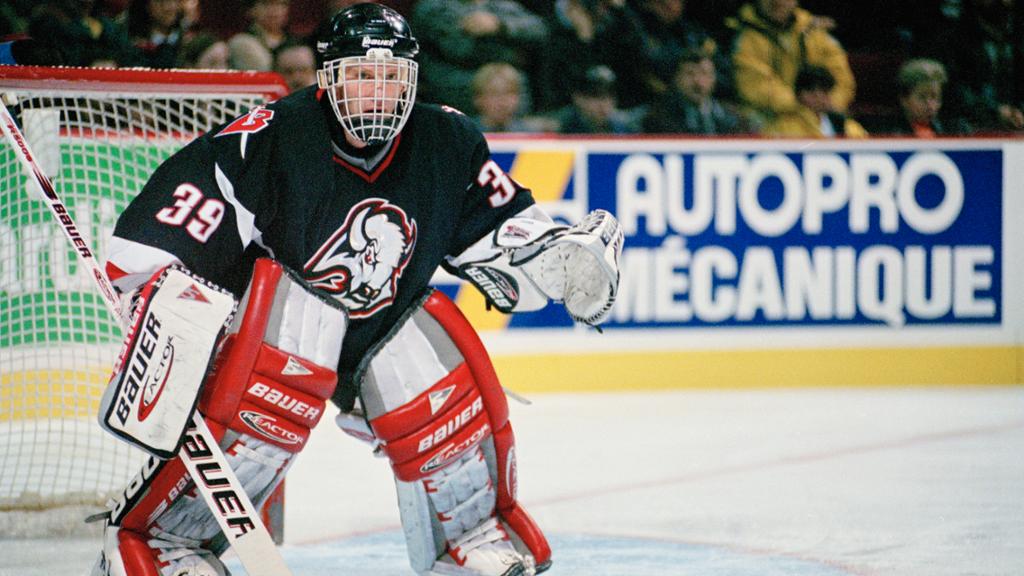
[NHL.com]
I mentioned in the opening paragraph that goaltending is the most important of a hockey team and it's true. They spend more time on the ice than any skater, more time than multiple skaters put together in fact. They also have an outsized and direct role on what goals go in the net, which is 50% of the game. A great goaltender can lift up a team in a way that no great skater, even the best of the best can. You can plop Wayne Gretzky at his peak on an awful hockey team and he will make them better, but their improvement will not be as great as if you dropped 1998 Dominik Hašek on that team.
A great example of this are two teams, the late 90s/early 00s Buffalo Sabres and the Florida Panthers of the same era. Both teams had transcendent talents on an otherwise pitiful roster. For the Sabres, that was Hašek, the greatest goalie of all-time at the peak of his powers. For the Panthers, that was Pavel Bure, a dynamic goalscorer of speed and skill at a time when the NHL was trending away from the rush offense and firewagon hockey that defined his game. Both players were having exceptional seasons, Hašek posting SV% clips in the high .930s, which, for the NHL, is patently crazy, and Bure scoring 58 and 59 goals to lead the NHL, totals that were extremely high for the era.
So both teams had poor rosters with one otherworldly talent firing on all cylinders... what happened? Hašek dragged the 1998 Sabres into the third round and the 1999 team to the Stanley Cup Final, while Bure's 2001 Panthers limped to a bottom five finish in a 30 team league, in spite of his NHL-best goal total. A God-Mode goaltender can singlehandedly drag a terrible team very far in a way that no skater can. And likewise a wretched goaltender can sink an entire team, even if that team is winning the chances battle consistently (2012-13 Michigan Hockey may remember this), in a way that is not remotely comparable to a skater having an off night.
That's true for an entire season and it's true for a specific game. You can play a great game and give the goalie good support, but if the goalie can't make enough saves, you're cooked. And sometimes you get caved in all night long, but the goalie steals it for you. No other position can do that, but a goalie sure can. You need a goalie to play well to win a championship, be it in the NHL or especially in college hockey. When I sang the praises of Erik Portillo in my post-regional column, I made sure to stipulate that "two more like this" was necessary in talking up Michigan Hockey's national title chances because I knew how conditional it all was on goaltending. I just didn't want to have to look back on that column with the thought process "man I'm glad I hedged there".
[AFTER THE JUMP: How this ties into Michigan]

3/24/2023 – Michigan 11, Colgate 1 – 25-11-3
3/26/2023 – Michigan 2, Penn State 1 (OT) – 26-11-3, Frozen Four
When I'm planning to do a game column for a given game, I spend my time watching it unfold while searching for predominant storylines. Narratives, overarching themes, something that links the action together. As a game shifts, that storyline may shift as well and so it's not uncommon to have multiple different themes/headlines circulating through my head over the course of the game. You have an idea of what you want to write about, then something new comes along and boots it from the spotlight.
On Sunday I had a couple different themes in my head during the Michigan/Penn State Regional Final. As Michigan peppered Liam Souliere with shots, hitting the post multiple times and dictating play, I figured an ice-breaker goal was inevitable and the plan was to talk about how the Wolverines just kept coming at Penn State until they finally cashed it in. Then Penn State took the lead and as the third period ticked along with the Lions leading 1-0, my focus shifted towards centering the narrative section of this column on how the NCAA Tournament's randomness and cruelty were going to strike again. I planned to write about how the better team, both over the course of the season and in that very game, was going to be eliminated because the NCAA sets up a profoundly stupid tournament with the goal of making sure lesser teams are on even footing with the great teams.
Then Michigan tied it. And then the game went into overtime. At this point I didn't know quite what to expect, other than to of course prepare for the worst outcome. There was no central theme in my head and I didn't get a chance to establish one in the 52 seconds before Mackie Samoskevich ripped a shot by Liam Souliere to clinch it for the Wolverines. The thrill of victory lit up Michigan Twitter and other social media spheres and after the high began to recede, I sat there wondering where exactly to go with it. There wasn't one obvious, cohesive story to tell about this game but then it dawned on me that the two storylines I was stewing over earlier in the evening was the story. It was a fusion of the two, that Michigan did keep at Penn State and eventually got the big goal... it just came after 22 minutes of staring down the barrel of a shotgun called randomness that defines this most cursed tournament in all of sports.
Sometimes you have to be faced with pain to achieve glory. And sometimes it takes a show of resilience to get it done.
-----

[David Wilcomes]
The story of Sunday's Regional Final is that Michigan was the better team. They managed to outshoot and out-attempt Penn State, both at 5v5 and in all situations, which, if you read my preview or are familiar with PSU Hockey, is an achievement. If you're out-attempting PSU Hockey, you're whipping them, to put it frank. Now shot attempts are not everything- NHL analytics types have moved steadily away from using Corsi to analyze games and predict future outcomes in recent years, favoring expected goals and other more advanced metrics (high danger chances/scoring chances). But in the under-funded and under-analyzed sport of college hockey, we peasants who rely on the public data only have access to Corsi.
Thankfully, there is a public expected goals reading and it's called the eye test. Watching the game reveals that not just did Michigan outshoot and out-attempt Penn State, they definitely owned the expected goals battle. The quality of chances and the volume of those chances was far superior for Michigan relative to Penn State. Another metric: the highlight footage. YouTube saint Matthew Loves Ball uploaded a 12 minute highlight package for this game and there is a single PSU offensive highlight in the first period to roughly five for Michigan. That's dominance.
It continued into the second period, Michigan largely controlling play and PSU attacking off the counter. The Wolverines got the first two power plays as well, with Adam Fantilli hitting the post on their second PP, the second time Michigan had hit the iron after Ethan Edwards was sure he had scored back in the first period. The Maize & Blue felt snakebitten at this point, firing shot after shot, many of them good looks, at a largely mediocre goalie who had decided to put on his Patrick Roy mask for that evening. And when they did get it by him, it was finding the iron or squibbing loose into the crease, only to be cleared by the defense.
[AFTER THE JUMP: More narrative]
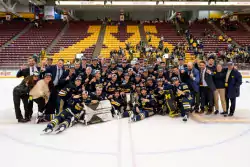
Winning Big Ten (Tournament) titles never gets old
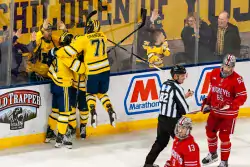
roasted buckeyes
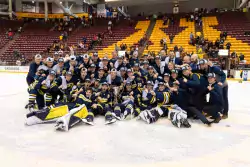
raise that chalice!
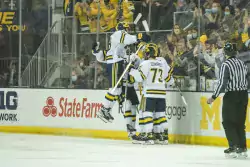
Sweet victory (but we're not there yet)
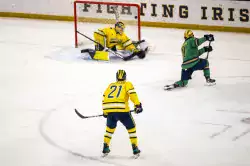
A very good team enters the postseason with nothing much accomplished yet
35